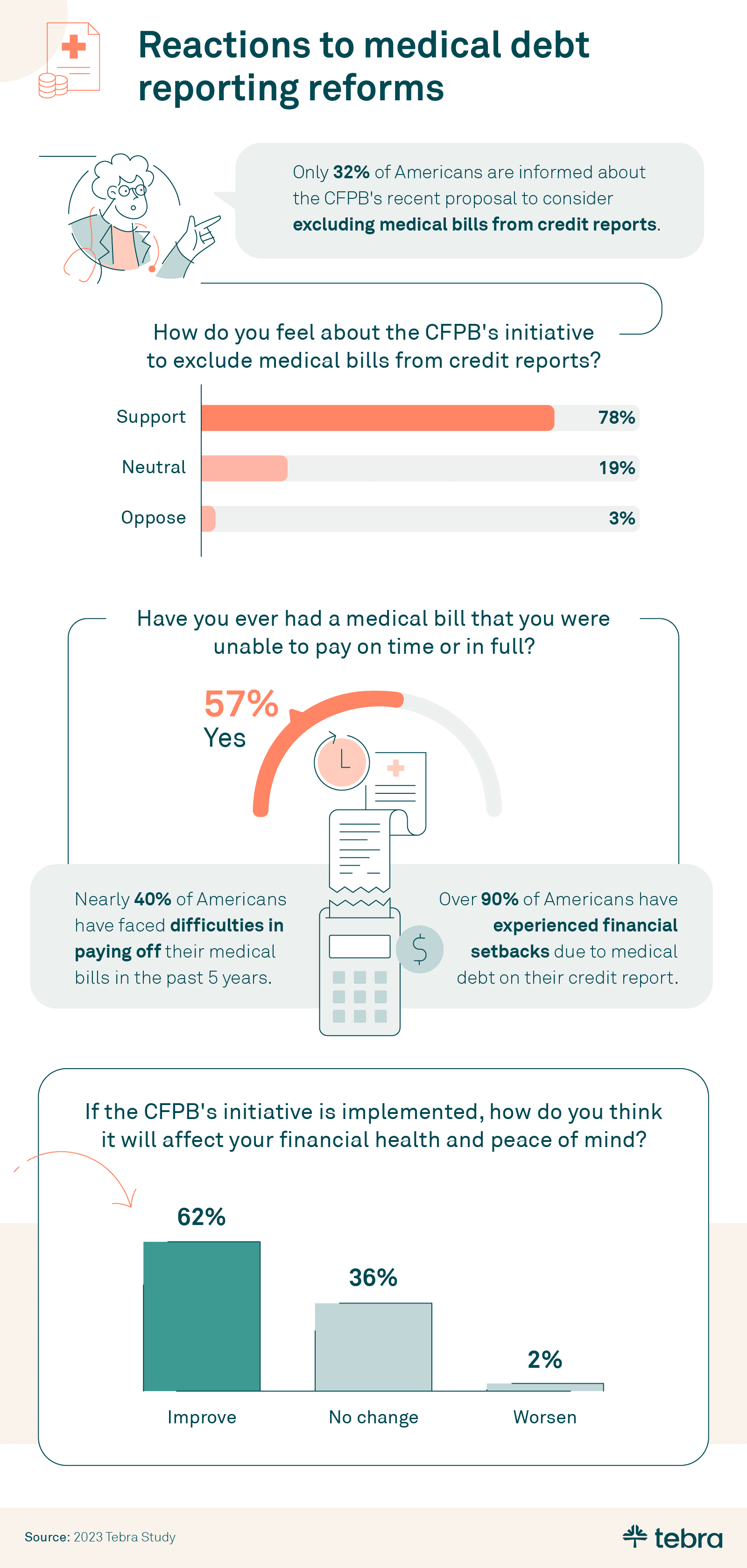Americans share their personal struggles with medical debt and express a collective sigh of relief as they anticipate a future where their financial health can recover, thanks to the CFPB’s new October 2023 initiative.
Medical debt overhaul: patients diagnose a financial breath of fresh air
In the wake of the Consumer Financial Protection Bureau’s (CFPB) recent call to potentially exclude medical bills from credit reports, Tebra sought to gauge patient reactions and understand their experiences under the current medical debt reporting system.
CFPB's proposed changes to the Fair Credit Reporting Act would eliminate the impact of medical debt on Americans’ credit so that people’s overdue medical bills wouldn’t contribute to bad credit scores.
The proposed changes were introduced in April 2022 by Vice President Kamala Harris “to ease the burden of medical debt.”
If finalized, the proposal would prohibit consumer credit reporting companies from considering medical debt in credit reports. The proposal would put an end to creditors including medical bills to ultimately stop “coercive collection practices,” the CFPB said.
About 1 in 5 Americans reported having medical debt, according to CFPB research. Unpaid medical bills total around $88 billion on 43 million credit reports, the CFPB estimated in 2022.
“Unpaid medical bills total around $88 billion on 43 million credit reports.”
Surveyed patients express relief at the proposed bill
A recent survey of 1,000 American patients by Tebra reveals insights into the challenges of medical debt. It also uncovers sentiments toward the proposed policy change and how it might ease financial and mental strain. This exploration aims to provide a better understanding of the impact of medical debt on individuals and highlight the potential relief the CFPB’s initiative could bring to many.

Key takeaways
- Only 32% of surveyed Americans feel informed about the CFPB’s recent proposal to consider excluding medical bills from credit reports.
- Nearly 80% of surveyed Americans support the CFPB’s initiative to exclude medical bills from credit reports.
- Over 90% of surveyed Americans have experienced financial setbacks due to medical debt on their credit report.
- Over 60% of surveyed Americans think the CFPB’s initiative will improve their financial health and peace of mind.
When asked how they feel about the reforms, 78% said they support the initiative. Less than 20% were neutral.
Most American patients report struggles with medical debt
Many Americans find healthcare costs unaffordable. Over half (57%) have been unable to pay a medical bill on time or in full, and nearly 40% have been struggling to pay off their medical debt within the past 5 years. A significant number of Americans — 90% — have grappled with financial setbacks due to medical debt on their credit reports. This debt reporting practice has likely hindered their access to credit, loans, and housing.
Medical debt relief likely to impact American's mental health
A whopping 62% of surveyed patients stated the removal of medical debt from their credit bureau reports would improve their mental and financial health. 36% reported the legislation would likely not change their peace of mind. Medical debt is often unavoidable; a patient needs timely care, no matter the cost. It not only strains American finances but also creates stress and anxiety. These impacts are likely why 78% of respondents support the CFPB’s call to remove medical debt records from credit reports.
Relief through policy change
The strong support for the CFPB’s proposed medical debt credit reporting change shows a nation desiring a more compassionate approach to unpredictable debts, where patients are not penalized for unforeseen or overwhelming healthcare expenses. As the CFPB considers this vital shift in policy, it is imperative to recognize the potential relief it could offer countless individuals. Surprisingly, only a third of Americans know about the proposal, highlighting a need for better communication and public awareness campaigns.
By prioritizing Americans’ financial and mental well-being, the CFPB can pave the way for a system that acknowledges the unique challenges posed by medical debt, ultimately fostering greater financial stability and peace of mind for all.
Methodology
Tebra surveyed 1,000 American patients to gauge their sentiments toward the Consumer Financial Protection Bureau’s (CFPB) recent proposal to consider excluding medical bills from credit reports. The average age of respondents was 48. The gender breakdown was 53% female, 47% male, and 1% non-binary. The generational representation was 10% baby boomers, 26% Gen X, 55% millennials, and 9% Gen Z.
About Tebra
Our mission is to provide healthcare practitioners with the technology and support they need to unlock better healthcare for every patient. We’ve developed an automated practice platform to serve as the backbone of medical practice success.
Fair use statement
You may share our research findings with others for any non-commercial purpose. We simply ask that you remember to include a link to this original source.





